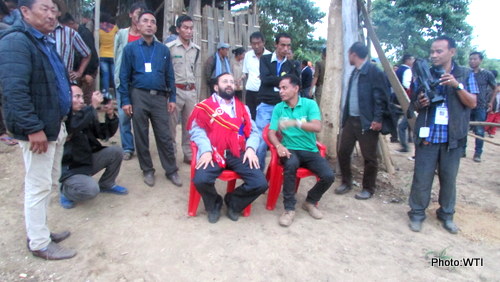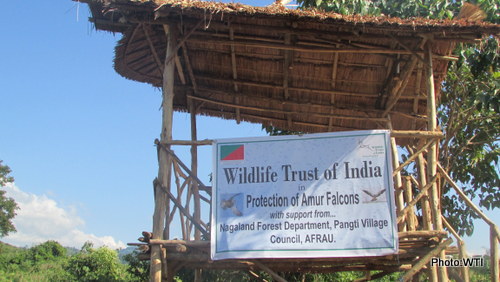Environment Minister Visits Doyang to Welcome Amur Falcons
Doyang, November 15, 2015: Nagaland took a giant leap in Amur falcon conservation when it banned poaching of these migratory birds in 2013. Since then a lot has changed and hunters have become the protectors of these beautiful falcons who travel thousands of kilometres each year to reach Nagaland. Well aware of this conservation success, Prakash Javadekar, Union Minister for Environment, Forests and Climate Change paid a visit to Doyang in Nagaland to welcome these falcons on November 15, 2015.
Each year from October, these birds numbering in lakhs cover the skyline of Doyang where the falcons roost and then start their long journey towards South Africa where they spend the cold winters. During his visit, the Minister announced that Doyang Lake would be developed as an eco-tourism site so that bird watchers can come and watch these magnificent raptors take over the sky. He also unveiled Amur falcon postage stamps to the public.
During his visit, he met and interacted with various stakeholders involved in Amur flacon conservation, including Wildlife Trust of India (WTI). Dilip Deori, Manager, WTI, briefed the minister on WTI’s conservation efforts in protecting Amur falcons. “I informed the honourable minister that WTI has been working in the area for the last four years which included other wildlife conservation issues. I briefed him about WTI’s work on mitigating Human Elephant Conflict and other components of Amur falcon conservation including reforming hunters to become part of the protection squad. The MoU with the council members and with Nagaland government was also discussed in great detail,” said Dilip Deori. The team had also put up banners and signages highlighting WTI’s work in the region which was noticed by the Minister as well. He also met Pangti village council, Amur Falcons Roosting Area Union (AFRAU), among others.
Ronchamo, Chairman, Pangti Village Council, in his inaugural address welcomed the Union Minster to the falcon capital of the world and spoke about the genesis of Amur falcon conservation in the state. He acknowledged the crucial support and work of WTI and Natural Nagas and mentioned how these two organisations created the need for urgent action to stop hunting of these raptors. He mentioned how WTI and Natural Nagas also conducted awareness programmes in villages near the roosting site. AFRU President also spoke about WTI’s role and how it has been working closely with villagers in the conservation of these raptors.











